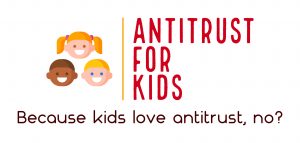Author: Molly Donovan
Olive (named for the fruit) is in eighth grade. She’s a very good inventor. For the science fair, Olive developed a simple device that allows students, each morning, to pre-select lunch items, ensuring each student’s preference is available in the lunch line later that day. It’s a simple-looking machine that the school ended up placing in the lobby for actual student use.
And the kids loved it. Everyone pre-selected lunch. Why not?
Here’s the trouble: Olive was secretly in cohoots with a lunch vendor (her aunt Clementine—also named for the fruit) so that students could only pre-select items made in Clementine’s own kitchen! The device simply did not present other vendors’ items as options! The result: Clementine’s sales soared, her prices went unchecked and kids didn’t have the pre-selection choices they should have had.
You’d think they’d notice right away, but it took some time for the kids to catch on. Once it did become clear that pizza was missing and Clementine’s calzones dominated, the kids were mad.
Everybody complained to the principal: you’ve got Olive in exclusive control of this device that everybody wants to use, and she’s allegedly abused that power to grow her family’s own catering business.
Shameful, no?
So, here’s what happened. The principal (a former antitrust lawyer from an unnamed major firm) decided to use the problem in an educational exercise. She felt there was no serious dispute that, under the circumstances, Clementine should return the ill-gotten gains as a donation to the school. The only question: what amount?
EXPERTS! The principal—and she thought this was very smart—would have parent-economists make presentations at a school assembly: one team would argue, based on fancy charts and graphs, that the amount owed is big; the other team would argue, with equally fancy visuals, that the amount owed is nothing at all, or at best, pretty small. Then the kids would vote. Good idea, but…
Was there a hiccup? Yes. The principal made the mistake of letting the lawyer-parents get involved. For the assembly, the lawyers developed Daubert-style challenges—why one expert wasn’t sufficiently qualified or didn’t do a good enough job with her analysis to be allowed to present at all. Those challenges were supposed to last 10 minutes or so, with the remaining 20 minutes reserved for judging the analyses on their merits: Who is most convincing? What number should be THE number? That’s the important part, right?
But somehow the challenges—really meant to weed out only the unverifiable stuff—got completely out of hand. I mean, could someone with a PhD in economics really be unfit to talk about the dynamics of supply and demand in a lunch line? But the lawyer-parents ran with it.
So much time and energy was spent on the challenges, the principal had to bring it to a stop: no more Daubert. Everyone’s an expert. Let’s move to the important question at hand.
Moral of the Story: It was brought to us by Judge Gonzalez Rogers in the District Court for the Northern District of California in the In re Apple iPhone Antitrust Litigation. The court admonished the lawyers there for giving into the oft felt urge to overuse Daubert:
“The Court has repeatedly advised the parties that Daubert motions are overused and strongly suggested they be used sparingly. Given the indication that Daubert motion(s) will or are being used in abundance, the Court vacates the hearing on the pending Daubert motion and suspends all further briefing on that motion. No further Daubert motions are allowed without a prefiling conference. Any party wishing to file a Daubert motion shall comply with this Court’s standing order with respect to summary judgment motions. In the required prefiling letters, the moving party shall specifically identify the prong of the Daubert framework upon which they wish to proceed, for example, unreliable methodology or principle, and identify specifically the expert’s purported failure. Mere disagreement with opinions is not sufficient.”
So, think twice before you (i) bring a borderline Daubert challenge or (ii) let the lawyer-parents get involved in school projects.
 The Antitrust Attorney Blog
The Antitrust Attorney Blog



